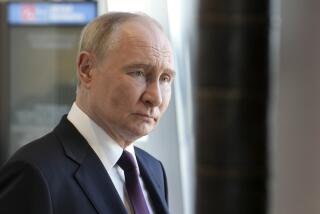In Russia, a Debate Over Democracy
MOSCOW — As high-profile opposition figures concluded a two-day gathering Wednesday to press for greater democracy, Russian President Vladimir V. Putin used a series of television interviews to fire back at his domestic and foreign critics.
Putin made a personal jab at Vice President Dick Cheney for remarks in May in which Cheney attacked Putin’s record on democracy and accused Moscow of using oil and gas as tools of geopolitical blackmail.
“I think that these kinds of comments from your vice president amount to the same thing as an unfortunate shot while out hunting,” Putin said, according to a transcript of an interview with NBC that was released by the Kremlin. Putin’s comment referred to a hunting accident in February in which Cheney wounded a companion.
The bid by Putin and his critics to shape the terms of debate over democracy in Russia forms part of the run-up to a summit of the Group of 8 leading industrialized countries scheduled to open Saturday in St. Petersburg. Although not part of the official agenda, the state of Russian democracy is expected to be a key topic.
Western concerns over Russia’s direction under Putin have been fanned by a steady consolidation of central authority during his presidency.
Critics say that with all three national television networks in effect under state control, the elimination of direct election of governors and growing pressure on nongovernmental organizations, Russia should no longer be considered a democracy.
“We want to show that there is the other Russia, which is very different ... from the Potemkin village presented by Putin to the rest of the world,” said Garry Kasparov, the former chess champion turned democratic activist, who was a key organizer of the “Other Russia” conference.
Kasparov said participants in the event at a Moscow hotel also hoped to encourage activists and politicians from across the opposition to unite in fighting for genuine democratic elections in the face of what he called a Kremlin effort to gradually establish a dictatorship.
In his television interviews, Putin ridiculed the idea that he was dismantling democracy.
“As Mark Twain said in respect to his own life, the rumors of the death of our democracy are highly exaggerated,” Putin told NBC.
Putin said that despite state control of nationwide television networks, robust media -- including digital, cable, local and regional television -- are increasingly free of state influence.
In interviews both with NBC and France’s TF-1 television channel, Putin charged that the U.S. bid to spread democracy had a colonialist tone.
“If we go back 100 years and look through the newspapers, we see what arguments the colonial powers of that time advanced to justify their expansion into Africa and Asia,” the president told TF-1.
“They cited arguments such as playing a civilizing role, the particular role of the white man, the need to civilize ‘primitive peoples,’ ” he continued. “We all know what consequences this had. If we replace the term ‘civilizing role’ with ‘democratization,’ then we can transpose practically word for word what the newspapers were writing 100 years ago to today’s world and the arguments we hear from some of our colleagues.”
The Other Russia conference called on Western leaders to pressure Putin in St. Petersburg to end what it described as systematic political repression. The gathering drew a number of prominent speakers, including former Prime Minister Mikhail M. Kasyanov, considered a potential opposition presidential candidate in 2008.
In his speech, Kasyanov referred to an incident during the 2004 parliamentary elections in which an activist with the radical National Bolshevik Party threw an egg at him when he entered his polling station and shouted, “Kasyanov, the election is a farce!”
“Now I understand she was absolutely correct,” he said.
More to Read
Sign up for Essential California
The most important California stories and recommendations in your inbox every morning.
You may occasionally receive promotional content from the Los Angeles Times.










